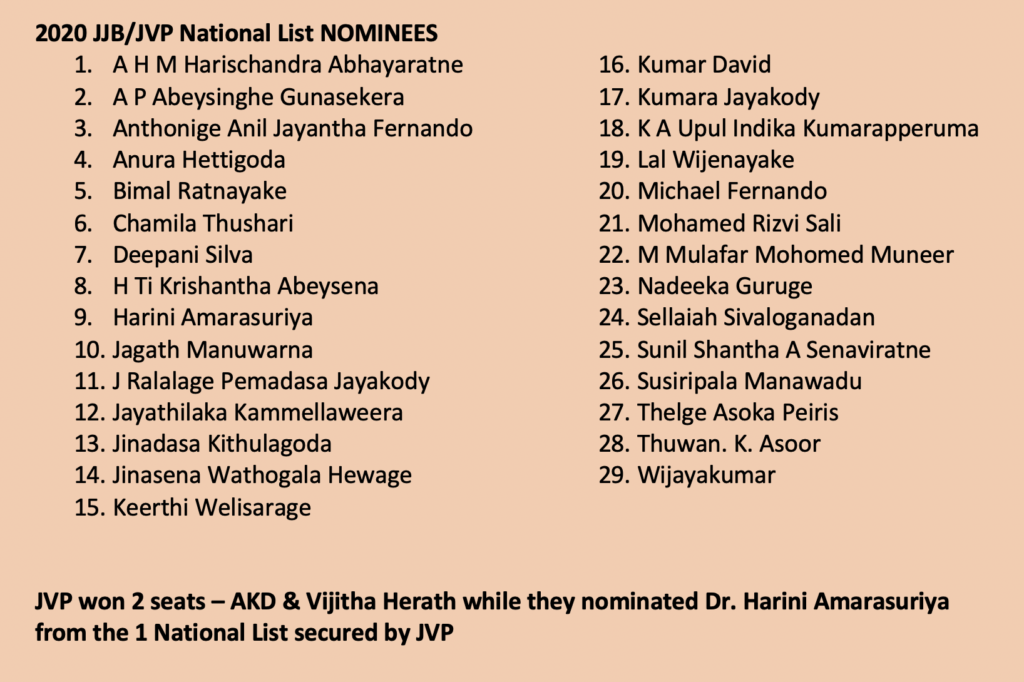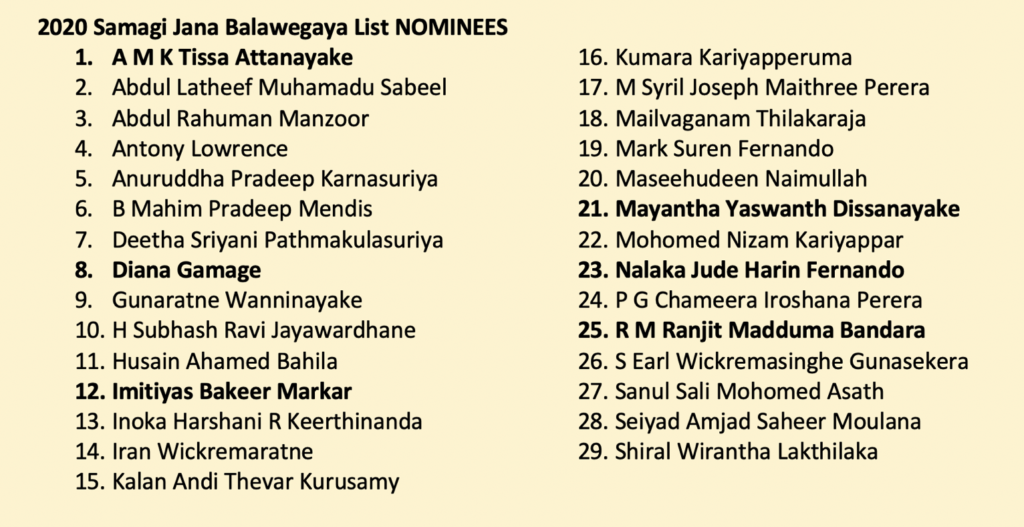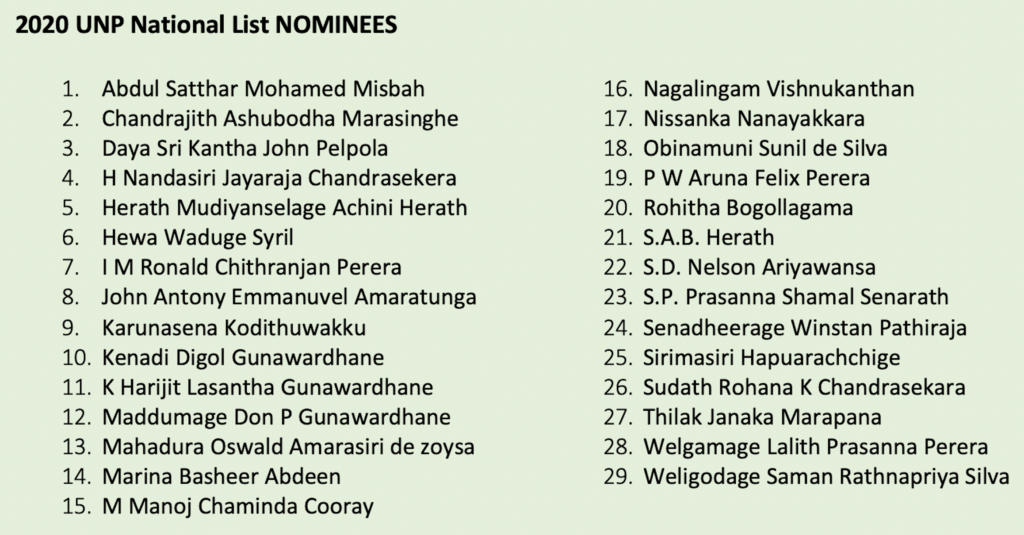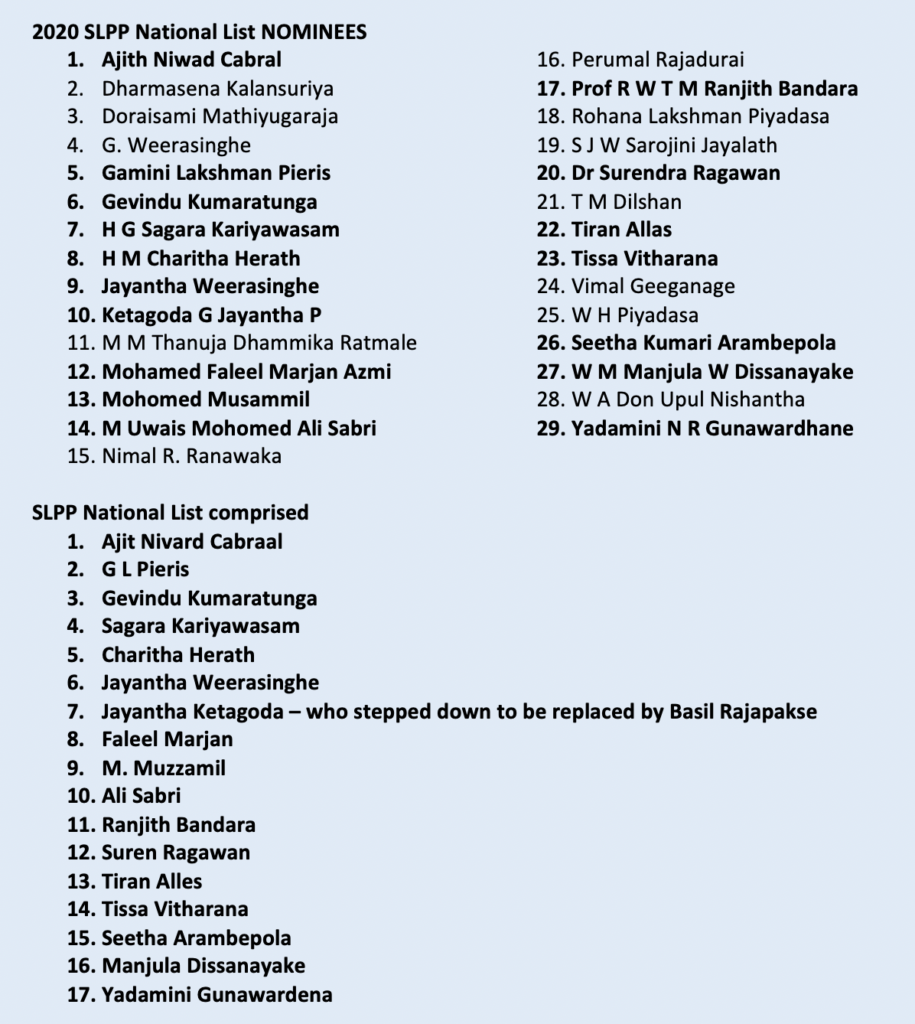
29 People enter Parliament without contesting elections & without the franchise of the People. This negates the principle of parliamentary democracy where the will of the People has been digressed without the consent of the People. The principle behind including a national list was to enable experts & professionals who could not contest elections but could contribute to legislative governance. While on paper this was a meritorious gesture, in reality the principle has been flouted to absorb all the bad eggs who either failed to get elected or could never stand for elections & win entry to Parliament. This component is negating the spirit of democracy & is violating the core foundation of the constitution – that being sovereignty is inalienable & with the People. The people chose their representatives via elections. But the people do not choose the members of the national list & thus national list members should only function on an advisory role instead of being given plum posts. It is time people demanded its removal.
Over the years parliament has been filled not with experts & professionals but with politicians who have been rejected by the people at election and as a means of a back door entry to parliament.
How can political parties ignore the spirit with which the national list was created?
Section 99A of the 14th amendment allows parties to ignore the lists they have given & nominate whomsoever they like.
2015 National List
Even the JVP that includes a colourful list of experts (auditor general, lawyers, university professors, writers – ended up removing them & plugging defeated JVP politicians. Ex: former auditor general Sarathchandra Mayadunne had to step down to return rejected Sunil Handunnetti to Parliament. The UPFA ended up nominating 7 defeated candidates to their final list. ITAK too nominated defeated candidates for its 2 national list slots. UNP included one defeated ACMC to its list
The 29 National List seats for 2020 were distributed thus
- 17 for SLPP
- 7 for SJB
- 1 for JJB/JVP (2 seats + 1 national list = 3 seats)
- 1 for ITAK (9 seats + 1 national list = 10 seats)
- 1 for AITC (1 seat + 1 national list = 2 seats)
- 1 for UNP (no district level seats + 1 national list = 1 seat)
- 1 for OPPP (our People of People Party) (no district level seat + 1 national list = 1 seat)



SJB secured 47 district level seats & 7 national list seats – total 54 seats
- Tissa Attanayake
- Imtiaz Bakeer Markar
- Eran Wickremaratne
- Mayantha Dissanayake
- Harin Fernando
- Ranjit Madduma Bandara
- Diana Gamage – who crossed over to the SLPP
Apart from Diana Gamage all of SJB nominees were politicians who had been standing for elections in the past & should not have had their names included into a national list.

UNP did not secure a single district level seat & the sole national list seat was taken by Ranil Wickremasinghe who contested elections but was defeated but re-entered Parliament through the back door nominating himself without giving place to the nominees given by UNP.

SLPP secured 128 seats + 17 national list = 145 seats
4 of the National List nominees have been given Cabinet level appointments and are making decisions without the franchise of the People.
These 4 are making key decisions pertaining to the country’s
- Finance (Ajith Nivard Cabraal & Basil Rajapakse after Jayantha Ketagoda resigned to enable Basil Rajapakse to enter Parliament)
- Foreign Policy & previously Education by GL Pieris chairman of SLPP
- Justice – Ali Sabri
Dr. Seetha Arambepola has been made a State Minister – State Minister of Skills Development, Vocational Education, Research and Innovation (113 days present in Parliament)
Dr. Charitha Herath is the COPE Chairman
Less than 100 days
G L Pieris (97)
Ajit Nivard Cabraal (86) – stepped down to become Governor CBSL
More than 100 days present in Parliament out of 150
Ali Sabri (105)
Seetha Arambepola (113)
Tissa Vitharana (116)
Prof. Ranjith Bandara (121)
More than 125 days present in Parliament out of 150
Suren Raghavan (125)
Jayantha Weerasinghe (125)
Manjula Dissanayake (129)
Jayantha Ketagoda (134)
Gevindu Kumaratunga
More than 140 days present in Parliament out of 150
- Muzzamil (141)
Faleel Marjan (141)
Charitha Herath (145)
Sagara Kariyawasam (145)
Yadamini Gunawardena (149)
Less than 50 days present in Parliament out of 150
Tiran Alles(50)
The national list of nominations violates the elective principle with which it was created. Though the national list of 29 members was created with good intention, it has become the loophole to nominate politicians likely to lose at an election, bring in politicians outside of the nominated list (Ranil Wickremasinghe & Sunil Handunetti), enable nominees to step down & bring in total outsiders without vote (Jayantha Ketagoda resigning for Basil Rajapakse) and now national list nominees are even crossing over (Diana Gamage)
There is a golden rule to Parliamentary Democracy. The will of the people must prevail & not the will of the political parties. People hold elections to vote their representatives to Parliament. No one should be seated in parliament without the people’s mandate. The irony is that in the present parliament key posts have gone to people who have no mandate from the People and who do not represent the People’s will. The arguments for their inclusion has been that they have given free legal advice & free English advice. If so, leaders who have made use of them must remunerate them personally & not by giving them state positions at state expense.
It is also noteworthy that the majority of these nominees are practicing lawyers & the question of conflict of interest is likely to arise as well as instances of bias and exertion of powers to influence legal outcome cannot be ruled out.
It is prudent to question why the entities claiming to stand up for democracy are not steering a campaign to remove the national list or insist that it enable ONLY experts to be included but only on an advisory role & not to hold cabinet or state level ministerial portfolios.
Cabinet & State Ministerial portfolios must be given to those who have entered Parliament with the People’s vote. If any of the national list MPs deem they are worthy of holding a Public Post, they must come forward to contest elections & face the People & obtain their mandate.
If we are going to talk democracy we must follow democratic norms as well.
Shenali D Waduge
